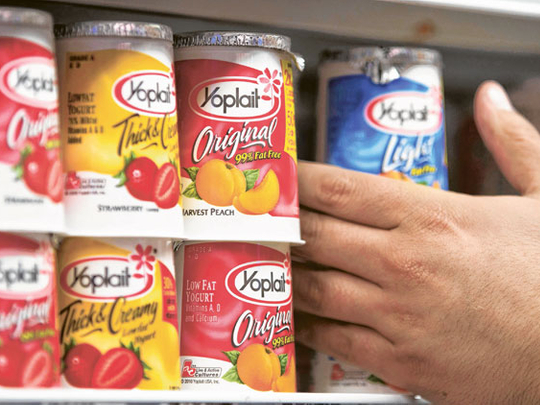
Dubai: Here's a recipe for potential success. Mix a global brand with Middle East aspirations and a local entity with the right manufacturing and distribution credentials. Go on to add the right marketing ingredients to try and create a wholesome market share.
This is exactly what Yoplait, the French yoghurt-maker and the world's second largest fresh dairy brand after Danone, has done through its association with Abu Dhabi's Agthia Group, which has the rights for the brand in the GCC. The latter also invested a substantial $13 million (Dh47.74 million) in a new plant to produce a carefully vetted selection from the extensive Yoplait range.
Consumer study
Now shoppers in the UAE are getting the taste of it. "In conjunction with Yoplait we did an extensive study on consumer insights and preferences when it comes to yoghurt," said Fasahat Beg, general manager for the consumer business division at Agthia Group.
"The products that we have now introduced reflect the findings — they were chosen to cater to the tastes of the local consumer right from the selection of flavours to the feel and texture it leaves in the mouth."
Indeed, the Yoplait range in the dairy section of local supermarkets extends from fresh natural yoghurt, in full cream and low fat, to those featuring fruit. There is even a Petits Filous selection, created specifically to satiate the little ones.
"The range carries a slight premium, but in line with what's right for the local market," said Beg. "The initial response has clearly validated we have got it right."
While it has the rights for the entire Gulf, Agthia plans to take a calibrated approach to taking on the other markets.
Such an approach is necessary and is in line with the nature of the industry, according to Beg.
Near-term focus
"The near-term focus has to be exclusively on the UAE and with yoghurt there is the challenge to create a cold-chain system," he added. "Once we have got everything right here, then it will be the right time to go for the new territories."
The plant has an installed capacity of 16,000 tonnes, which Beg rates more than enough to feed the entire GCC distribution network as and when that comes into play. "As business grows, we can easily add new lines — meeting future production requirements are not an issue," he said.
Prior to striking the agreement with Agthia in August 2010, Yoplait — which has a 10 per cent share globally — was available in the local market through imports. Now that it is being produced here, the brand owner and partner get to have full control over production and the distribution patterns.
"The growth in the local dairy category feeds into the growing awareness of how it can contribute to an individual's health and wellness," said Beg.
"And wherever there are concerns about lifestyle diseases, fresh is always rated as the best option.
"Within the broader dairy category, yogurt is getting a lot of attention with the strong players seeking more growth and new entrants trying to get in as well. It's a trend that is good for the market."
What Agthia does not plan to do is to create a retail format for yoghurt-based beverages.
Eyeing new segment
Now that its plans for Yoplait are realised, the Agthia Group plans to tuck into the frozen baked products category. This will also be done by setting up a new plant.
"We have grown significantly in the last four to five years — we are in dairy and juices and this year moved into fresh juices as well," said Fasahat Beg, general manager for Agthia's consumer business division. "We are a leader in [bottled] water. We have been pretty deliberate in the way we have gone about securing our presence in new categories. The intention is to create synergies rather than cannibalising any of the existing products. It has worked well for us."
Markets
The market for fresh dairy products in the UAE is estimated at $135 million annually, while that of the GCC, excluding Saudi Arabia, is around $200 million.
The annual growth rate in the UAE is averaging 4 per cent.











